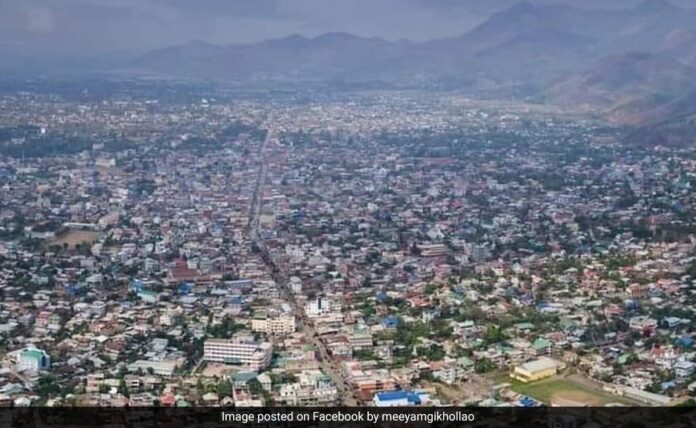New Delhi:
Representatives of a Kuki-Zo body from Manipur met Union Home Ministry officials in Delhi and sought a separate administration carved out of the violence-hit state. The members of the Kuki-Zo Council (KZC) also requested the Centre to start a political dialogue to resolve the Manipur crisis.
The Kuki-Zo delegation led by KZC chairman Henlianthang Thanglet met a two-member central team headed by adviser to the home ministry in the northeast, AK Mishra. The other was Intelligence Bureau Joint Director for the northeast, Rajesh Kamble.
“We placed our demand for a separate administration for the Kuki-Zo people of Manipur and the initiation of a political dialogue,” KZC spokesperson Ginza Vualzong said.
Mr Vualzong has also been associated with the Churachandpur-based Kuki civil group Indigenous Tribal Leaders’ Forum (ITLF) as its spokesperson.
The meeting took place days after the KZC representatives met Manipur’s new Governor Ajay Kumar Bhalla in Kuki-dominated Churachandpur district. The Governor had sought their cooperation in maintaining peace in Manipur and finding a solution.
The KZC in the meeting with the Centre’s officials in Delhi requested to ensure the “buffer zones” – which the Manipur government calls “sensitive areas” – in the foothills are not violated by the valley-dominant Meitei community.
There are many villages of the Kuki tribes in the hills surrounding the Meitei-dominated valley. The clashes between the Meitei community and the nearly two dozen tribes known as Kukis, who are dominant in some hill areas of Manipur, have killed over 250 people and internally displaced nearly 60,000.
The general category Meiteis want to be included under the Scheduled Tribes category, while the Kukis who share ethnic ties with people in neighbouring Myanmar’s Chin State and Mizoram want a separate administration, citing discrimination and unequal share of resources and power with the Meiteis.
Both sides have accused each other of attacking villages in the foothills.
The Manipur government on December 19, 2024, in a statement said there was no organisation called “Kuki-Zo Council”. The KZC, formed in October 2024, had objected to Chief Minister N Biren Singh passing through Kangpokpi district in order to reach Senapati district, where Mr Singh participated in a local festival.
The Kuki tribes hold Mr Singh, who belongs to the Meitei community, responsible for starting the ethnic violence. They have also submitted to a commission of inquiry under the MHA purported audio clips in which the chief minister was allegedly heard admitting he was responsible for the spark that lit the fuse.
Separate Administration Deadlock
Kuki-Zo groups, including insurgent organisations that represent their tribes and that signed the controversial suspension of operations (SoO) agreement with the Centre and the state government, have pointed at the ethnic clashes that began in May 2023 as the reason why they escalated their demand from an autonomous council to a separate administration, or a Union Territory with an assembly.
The World Kuki-Zo Intellectual Council (WKZIC), however, in a memorandum to Manipur’s new Governor on January 15 said the Kuki tribes have been demanding a state “since 1946-47.”
“We have been demanding Constitutional Kukiland state under Article 3 of the Indian Constitution, since 1946-47 to the first Prime Minister of India PM Jawaharlal Nehru in the name of Kuki National Assembly (KNA), resurged by Kuki Inpi Manipur (KIM), Kuki State Demand Committee (KSDC) and KNO-UPF who were under SoO with GoI since 2008, to safeguard and in recognition of our community’s rights, including our right to self-determination, cultural identity, and linguistic heritage,” the WKZIC said in the memorandum, which also detailed hardships of the Kuki tribes since India’s Independence.
The internally displaced people from both communities are yet to return home.

Kuki leaders have said a “political solution” in the form of a separate administration should be discussed first before any other issues, including the return of thousands of people living in relief camps.
Meitei leaders have, however, cited this condition placed by the Kuki leaders as a deceitful attempt to set up a narrative for an ethnocentric homeland demand; the Meitei leaders’ argument is that talks can go on while at the same time people living in difficult conditions in the camps can also return home since no territory is ethnic exclusive.
The demand for an ethnocentric homeland is untenable and obsolete in Manipur, where at least 35 communities co-exist, a group of activists and academics from the violence-hit state bordering Myanmar had said at a side event of the 57th session of the United Nations Human Rights Council (UNHRC) in Geneva in October.
Suspension of Operations (SoO) Agreement
Under the SoO agreement, Kuki-Zo insurgents are to stay at designated camps and their weapons kept in locked, monitored storage.
The Manipur government has been asking the joint monitoring group, which reviews the SoO agreement every year, to scrap it for good, over allegations that the SoO groups have been involved in the Manipur violence from the beginning. The SoO agreement lapsed in February this year.
Meitei leaders have alleged the SoO groups have been working to strengthen themselves over the years by taking advantage of the ceasefire, until a time came to engineer a violent attack for a separate land. Geopolitical analysts have speculated the Kuki armed groups were used as mercenaries to fight Meitei and Naga militants operating in the India-Myanmar border.
The ITLF and the Kangpokpi-based Kuki group Committee on Tribal Unity (CoTU), their 10 MLAs, and the nearly two dozen insurgent groups that have signed the SoO agreement have come on the same stage in demanding a separate administration carved out of Manipur.




